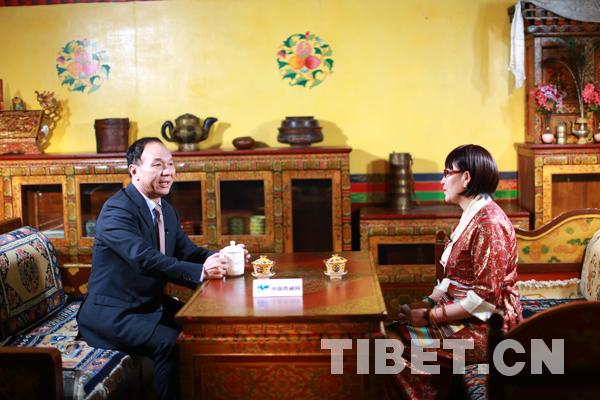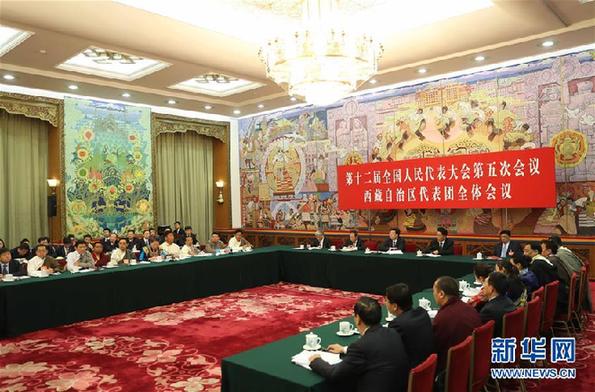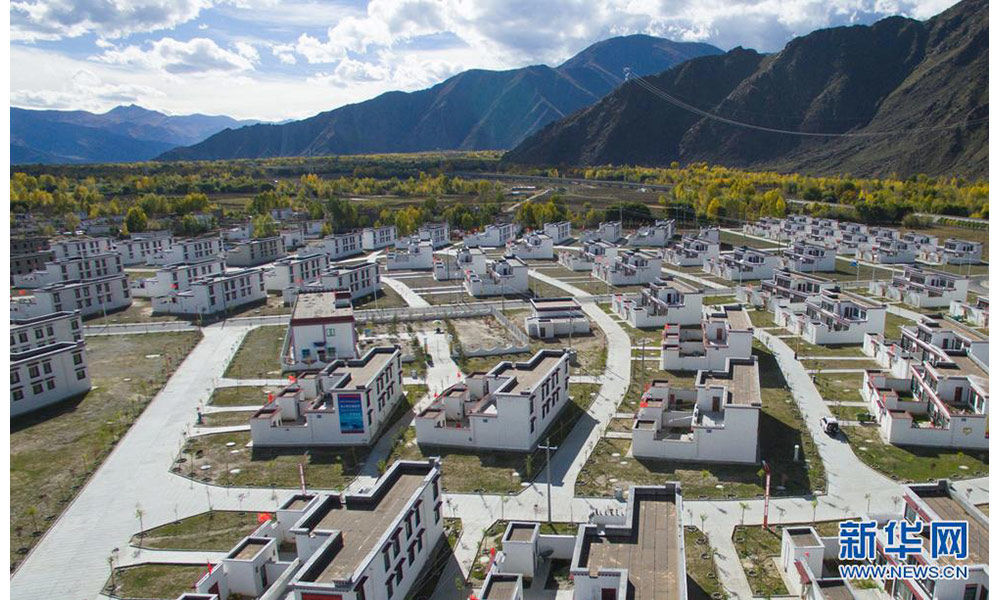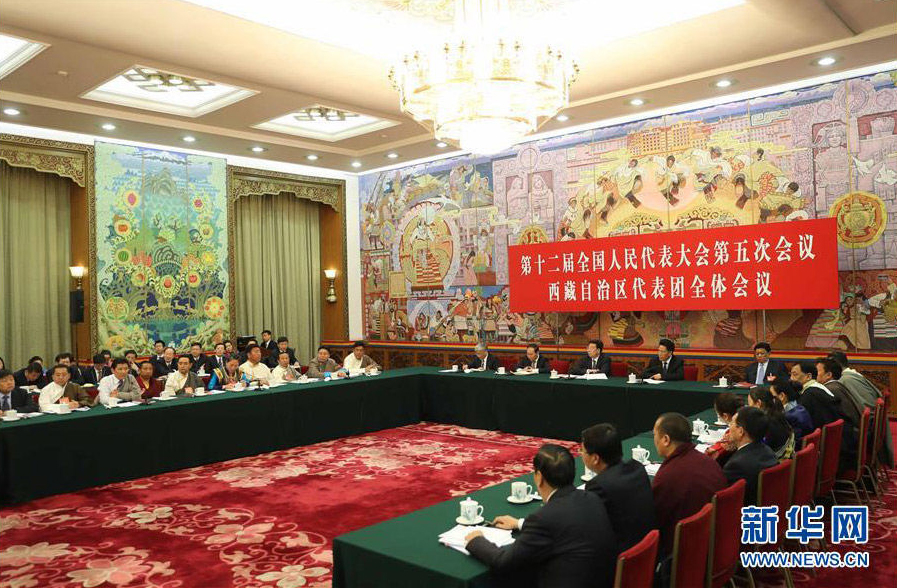Interview: Chairman of Tibet talks about Tibet

Qi Zhala, Chairman of Tibet Autonomous Region, recently received a joint interview by China's Tibet magazine and China Tibet Online.
Qi Zhala, Chairman of Tibet Autonomous Region, recently received a joint interview by China's Tibet magazine and China Tibet Online. During the interview, Qi Zhala expressed his views on Tibet's ecological environment, poverty alleviation work, Tibetan cultural protection and heritage and other issues.
The Chairman's concerns
On January 15, 2017, Qi Zhala was elected chairman of Tibet Autonomous Region. Later, on two occasions before and after the Spring Festival, he went for investigations in Nagqu, which has the worst natural conditions in Tibet. He spoke with Tibetan farmers about production and other general chit chat. He also chatted with local administrators about people's livelihoods and tackling poverty.
Then what was he most concerned about during the investigations?
"The average altitude in Nagqu is over 4,500 meters and the climate is bitterly cold and dry. The oxygen content there is only half that of sea level. But it is the inner circle of ‘China's Water Tower' and ‘Asia's Water Tower', and protection of ecological environment is of paramount importance. With an area of more than 400,000 square kilometers, it is Tibet's most concentrated poor area; severe poverty stretches for miles, and it is hard to tackle. What should be done for the next stage of targeted poverty alleviation? These are new issues for me and a new challenge," Qi Zhala said sincerely.
Qi Zhala talked about his work experience in Yunnan's Dechen and Lhasa. Although both are Tibetan inhabited areas, they are mainly agricultural and forest areas. How should one go about starting work on a pastoral area like Nagqu?
"It really needs investigation and learning. The trips have given me a deeper understanding of the lives of people in pastoral areas, especially highland areas with an altitude of more than 4500 meters. I also gathered a strong sense of the difficulties and problems they face," he said.
Heritage and protection of Tibet's traditional culture
Tibetan culture attracts tourists from home and abroad and is a shining pearl of Chinese culture, as well as a valuable asset for world culture. In terms of its inheritance and protection, Qi Zhala said that this is one of the pieces of work he is most concerned about.
In 2012, considering the lagging state of infrastructure on Lhasa's Barkor Street, such as the imperfect drainage system and the aging power lines, the government decided to transform the ancient cities, with the old city of Lhasa as the focus, including the whole Lhasa, Shannan, Qamdo and other places with traditional culture. During the transformation, all the unnecessary layout and commercial aspects were completely cleared up. Processing enterprises, schools and other businesses, as well as everything that can develop and survive in other places were all moved elsewhere," said Qi Zhala.
In the past, there were more than 4360 mobile stalls on Barkor Street. During Sagazlaba Festival and other holidays, the streets were congested with people circumambulating, worshiping the Buddha and shopping. The power lines were hazardous and there was a high risk from flammable and explosive materials.
"The original stalls on Barkor Street have all moved into a new shopping mall. Now the pedlars don't have to worry about wind, rain, sun or coldness in winter. They can use the stall for free for eight years and if required 10 or 20 years. What comes from the people should benefit the people. It's been four years since they moved and everyone is happy with their work," Qi Zhala explained.
In addition to transforming the old cities, Lhasa also built a cultural park based on international tourism models. The major drama "Princess Wencheng" and the performance location itself is a tourist attraction. Tourists from home and abroad can buy tickets online or from a travel agent to watch the performance whose lights and choreography are all of international standards. It is not only an audio-visual feast, but also a platform for appreciating the friendship between Chinese and Tibetans.
When talking about this show, Qi Zhala said that they only had seven or eight months from choosing the site to building. Several works were taking place simultaneously; some were writing the script, while others started the building and recruited farmers to act.
"At that time the weather was bad; it was cold and rainy and the roads were slippery. I said to all the stuff, ‘just forget the rain, we must press on!' I remember one of the vice mayor of Lhasa slept on the building site in night, as did a few other leaders – everyone was working together on this," Qi Zhala said.
"Up to now, the drama has had an audience of over 500,000 people," Qi Zhala said, adding that all their work and efforts aim to ensure that the 1400-year-old living history and culture of old cities can continue.
In order to complete the transformation of Barkor Street, Qi Zhala is often seen at the construction site at 11pm, even 1am sometimes. He came up with a metaphor stating that leaders "can't be barking orders from the shore, but taking the lead in the water".
Your Comment
Name E-mailRelated News
-
;
-
-

-
Over 1,700 ethnic, religious activities peacefully held in Tibet
The regional government in Tibet hailed social stability and religious harnomy in the autonomous region, citing over 1,700 ethnic and religious activities held there in a peaceful and orderly manner, according to a report released Friday.
-
-
-

-
Tibet to spend big on fighting poverty
The government of southwest China's Tibet Autonomous Region plans to allocate 30 billion yuan (4.3 billion U.S. dollars) in 2017 to improve the lives of local residents.
-
-
-

-
Tibet delegation submits 25 proposals to the National People's Con
A total of 25 proposals were submitted by the Tibet delegation to the National People's Congress during the fifth session of the 12th NPC which concluded Wednesday.
-
Based in Lhasa, Tibet Vista is a Tibet travel agency that specialized in Tibet permit, and Tibet tours for both private and group travelers at a local price!
•4 Days Lhasa City Group Tour from USD 460 •8 Days Everest Base Camp Group Tour from USD 850 •15 Days Mt.Kailash Group Tour from USD 1780 •2016 Tibet Train Tours from Beijing, Shanghai, Chengdu, Xining,etc










